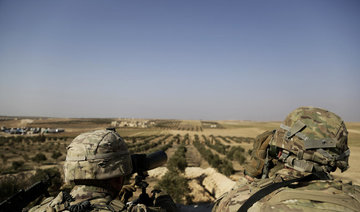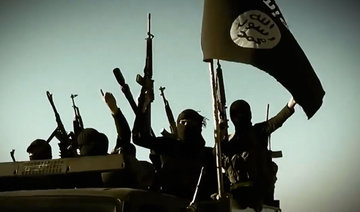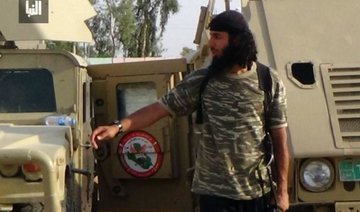LONDON: The mother of a man murdered by the British-born Daesh extremists and a French hostage who survived captivity with their cell said the two fighters captured in Syria should spend the rest of their lives in prison.
Diane Foley, whose son James was kidnapped and eventually executed, welcomed the capture of Alexander Kotey and El-Shafee ElSheikh, two of the so-called “Beatles” cell, captured by the US-backed Syrian Democratic Forces in Syria, and said she wanted them to be put on trial and jailed for life.
“Their crimes are beyond imagination. They really have not done anything good in the world so I think they need to spend the rest of their life being held,” she said.
French journalist Nicolas Henin was held with other hostages, including fellow journalist James Foley, in an underground cell. One of his captors was Mohammed Emwazi, the Kuwaiti-born Briton nicknamed Jihadi John, who was notorious for his brutality.
Henin spent ten months in captivity — six of them in a cell underground in Syria and chained for long periods to three other French hostages.
He said there were also French extremists among their captors and firmly believes that all captured Daesh insurgents should be tried in their home country, including the two “Beatles.” Handing them over to the Americans to be sent to Guantanamo Bay would only breed more violence and turn them into martyrs, he added.
“The worst thing we can do with the terrorist is to deprive him of his rights, because then you make a terrorist become a victim, and if you victimize someone then you just fuel his narrative and you just confirm his narrative. So everybody has a right for a fair trial and for justice,” Henin said.
He and three compatriots were released in April 2014 after lengthy negotiations with the French government, although Francois Hollande, who was president of France at the time, insisted no ransom had been paid.
Senior SDF official Redur Xelil told Reuters on Friday that Kotey had been aiming to reach Turkey when he was captured by in a rural area of Raqqa province on Jan. 24.
“He was intending to escape toward Turkey with cooperation and coordination with friends of his on the Turkish side,” Xelil said. “He is now under investigation with us,” he said.
A senior security official in Turkey, however, said it was “nonsense” that Daesh militant would try to reach Turkey.
The group of four British Daesh militants were nicknamed the Beatles because of their British accents.
They are known to have captured at least 23 foreign hostages, nearly all of whom were ransomed or killed. The gang were known to torture their prisoners with tasers, water boarding and mock executions.
Some of their victims, including British aid workers David Haines and Alan Henning, were executed on camera.
Emwazi was killed in an airstrike in 2015 in Syria. Another member of the British cell, Aine Davis, is serving seven-and-a-half years in a Turkish prison after being convicted of terrorism charges.
The British defense secretary Gavin Williamson welcomed news that the two members of the British cell who remained at large had been captured.
“These are people who have done absolutely vile & despicable crimes and brought absolutely so much misery. It is good that they have been hunted down and caught,” he said.
Defense minister Tobias Ellwood, whose brother Jonathan was killed in a terrorist attack in Bali in 2002, said that while the rules of engagement on the battlefields of Iraq and Syria authorized the killing of terrorists, the two Britons should “answer and be judged to a legitimate authority” and called for a special court to be set up for the trials of Daesh militants.
“The horror of 9/11 meant we briefly lost sight of the standards and rule of law that took centuries to develop and fundamentally distinguish us from the terrorist. Guantanamo Bay created a new combatant status that bypassed the Geneva Convention, used torture and failed to address a wider global jihadist insurgency that continues today,” he said.
“Given the scale of foreign fighters attracted to Daesh, we should consider an agreed international process involving [the International Criminal Court at] the Hague which ensures terrorists from any origin are transparently and fairly held to account for their actions.”
Families of Daesh ‘Beatles cell’ welcome their capture
Families of Daesh ‘Beatles cell’ welcome their capture
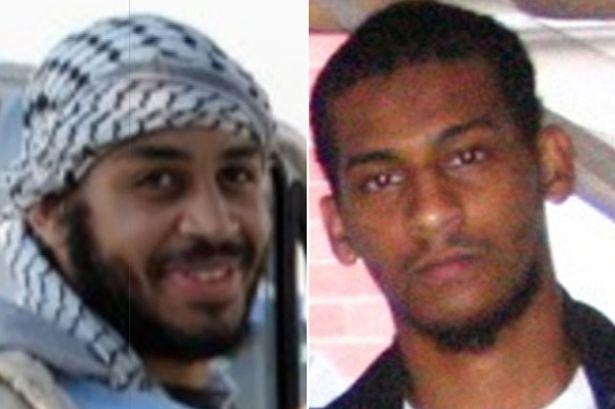
South Korea’s parliament impeaches acting president Han Duck-soo
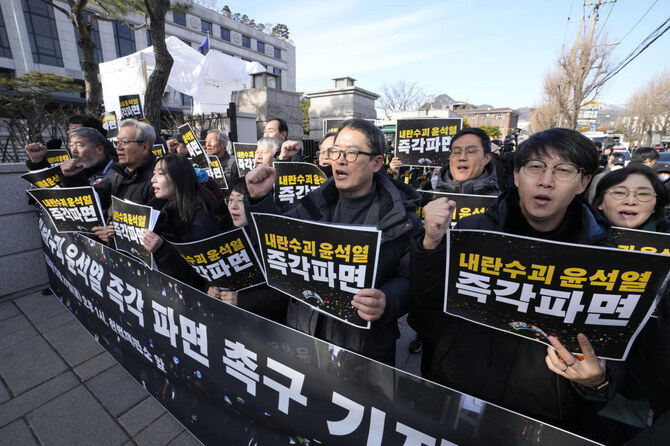
- The motion led by opposition parties passed with 192 of the 300 votes amid rowdy scenes by ruling People Power Party members
SEOUL: South Korea’s parliament impeached acting President Han Duck-soo on Friday over a short-lived martial law, plunging the country deeper into political chaos, as the Constitutional Court said it would swiftly trial suspended President Yoon Suk Yeol.
The impeachment of Han, who has been acting president since Yoon was impeached on Dec. 14 for declaring martial law on Dec. 3, has thrown South Korea’s once-vibrant democratic success story into uncharted territory.
The motion led by opposition parties passed with 192 of the 300 votes amid rowdy scenes by ruling People Power Party members who surrounded the speaker’s podium chanting the vote was invalid and parliament had committed “tyranny.”
Ahead of the parliamentary session, opposition leader Lee Jae-myung said his Democratic Party, which has majority control of parliament, will go ahead with the plan to impeach the acting president, accusing Han of “acting for insurrection.”
“The only way to normalize the country is to swiftly root out all the insurrection forces,” Lee said in a fiery speech, adding the party was acting on the public order to eradicate those who have put the country at risk.
There has been overwhelming public support for Yoon’s removal, according to opinion polls conducted after his martial law attempt.
The plan for a vote to impeach Han was unveiled on Thursday by the main opposition Democratic Party after he declined to immediately appoint three justices to fill vacancies at the Constitutional Court, saying it would exceed his acting role.
Until just before voting began, it was unclear how many votes were needed to impeach Han as acting leader. The threshold for a prime minister is a simple majority, while a two-thirds majority is needed for a president.
Speaker Woo Won-shik declared a simple majority would constitute parliamentary approval.
Han said in a statement after the vote that he would step aside to avoid more chaos and will await a Constitutional Court ruling on his impeachment.
By law Finance Minister Choi Sang-mok will assume the acting presidency.
Choi earlier pleaded with parliament to withdraw the plan to impeach Han, saying it would do serious damage to the country’s economy.
The South Korean won retreated to 1,475.4 per dollar, down 0.53 percent at 0707 GMT ahead of the parliamentary vote.
The vote to determine Han’s fate comes on the same day the Constitutional Court held its first hearing in a case reviewing whether to overturn the impeachment and reinstate Yoon or remove him permanently from office. It has 180 days to reach a decision.
North Korean soldier captured in Ukraine died from injuries – South Korea’s spy agency

- The soldier was captured by the Ukrainian army
- Location where he was seized was unknown
SEOUL: South Korea’s spy agency said Friday it had confirmed that a North Korean soldier sent to back Russia’s war against Ukraine had been captured by Ukrainian forces.
Pyongyang has deployed thousands of troops to reinforce Russian troops, including in the Kursk border region where Ukraine mounted a shock border incursion in August.
“Through real-time information sharing with an allied country’s intelligence agency, it has been confirmed that one injured North Korean soldier has been captured,” South Korea’s National Intelligence Service said in a statement.
The soldier was captured by the Ukrainian army, an intelligence source told AFP, adding that the location where he was seized was unknown.
The first confirmation of the capture of a North Korean soldier came days after Ukrainian President Volodymyr Zelensky said Monday that nearly 3,000 North Korean soldiers had been “killed or wounded” so far.
Seoul’s Joint Chiefs of Staff (JCS) also said Monday that more than 1,000 North Korean soldiers have been killed or wounded.
The JCS had also said that Pyongyang is reportedly “preparing for the rotation or additional deployment of soldiers” and supplying “240mm rocket launchers and 170mm self-propelled artillery” to the Russian army.
Seoul’s military believes that North Korea was seeking to modernize its conventional warfare capabilities through combat experience gained in the Russia-Ukraine war.
North Korean state media said Friday that Russian President Vladimir Putin sent a New Year’s message to North Korean leader Kim Jong Un, saying “the bilateral ties between our two countries have been elevated after our talks in June in Pyongyang.”
A landmark defense pact went into effect in December after the two sides exchanged ratification documents.
Putin hailed the deal in June as a “breakthrough document.”
‘Dangerous new era’: climate change spurs disaster in 2024

- This year was hottest in history, with record-breaking temperatures in atmosphere, oceans acting like fuel for extreme weather
- World Weather Attribution said nearly every disaster they analyzed over the past 12 months was intensified by climate change
PARIS: From tiny and impoverished Mayotte to oil-rich behemoth Saudi Arabia, prosperous European cities to overcrowded slums in Africa, nowhere was spared the devastating impact of supercharged climate disasters in 2024.
This year is the hottest in history, with record-breaking temperatures in the atmosphere and oceans acting like fuel for extreme weather around the world.
World Weather Attribution, experts on how global warming influences extreme events, said nearly every disaster they analyzed over the past 12 months was intensified by climate change.
“The impacts of fossil fuel warming have never been clearer or more devastating than in 2024. We are living in a dangerous new era,” said climate scientist Friederike Otto, who leads the WWA network.
That was tragically evident in June when more than 1,300 people died during the Muslim Hajj pilgrimage in Saudi Arabia where temperatures hit 51.8 degrees Celsius (125 degrees Fahrenheit).
Extreme heat — sometimes dubbed the ‘silent killer’ — also proved deadly in Thailand, India, and United States.
Conditions were so intense in Mexico that howler monkeys dropped dead from the trees, while Pakistan kept millions of children at home as the mercury inched above 50C.

Greece recorded its earliest ever heatwave, forcing the closure of its famed Acropolis and fanning terrible wildfires, at the outset of Europe’s hottest summer yet.
Climate change isn’t just sizzling temperatures — warmer oceans mean higher evaporation, and warmer air absorbs more moisture, a volatile recipe for heavy rainfall.
In April, the United Arab Emirates received two years worth of rain in a single day, turning parts of the desert-state into a sea, and hobbling Dubai’s international airport.
Kenya was barely out of a once-in-a-generation drought when the worst floods in decades delivered back-to-back disasters for the East African nation.
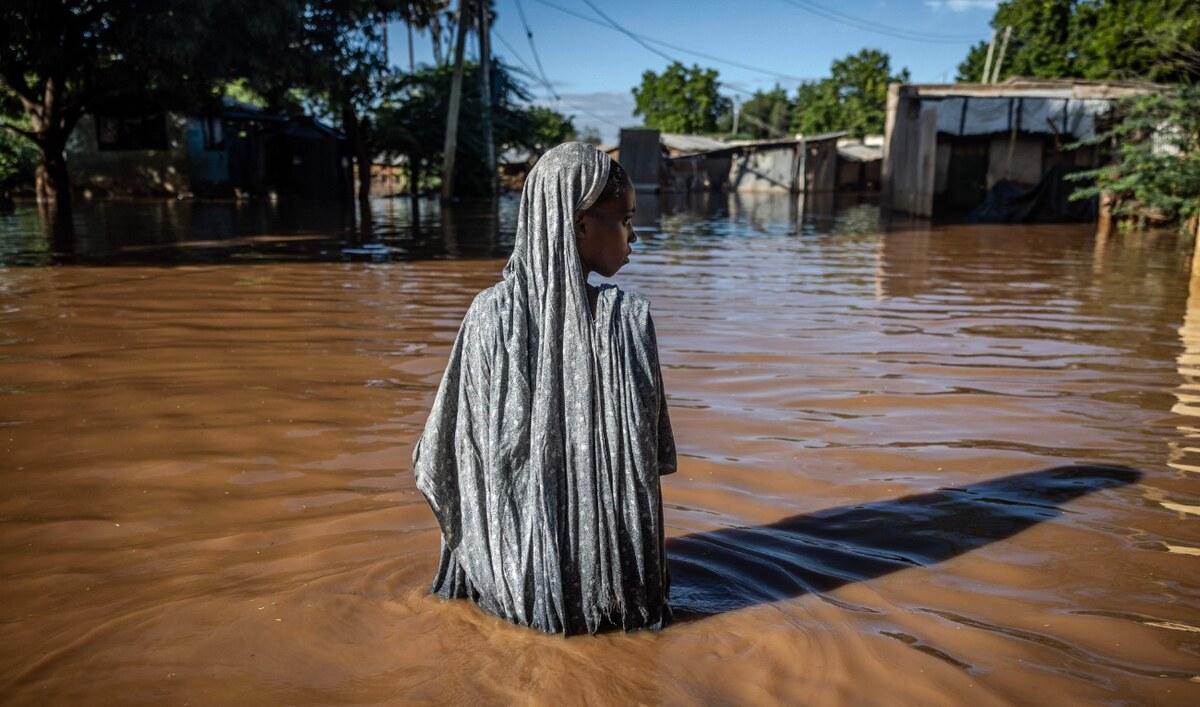
Four million people needed aid after historic flooding killed more than 1,500 people across West and Central Africa. Europe — most notably Spain — also suffered tremendous downpours that caused deadly flash flooding.
Afghanistan, Russia, Brazil, China, Nepal, Uganda, India, Somalia, Pakistan, Burundi and the United States were among other countries that witnessed flooding in 2024.
Warmer ocean surfaces feed energy into tropical cyclones as they barrel toward land, whipping up fierce winds and their destructive potential.
Major hurricanes pummelled the United States and Caribbean, most notably Milton, Beryl and Helene, in a 2024 season of above-average storm activity.
The Philippines endured six major storms in November alone, just two months after suffering Typhoon Yagi as it tore through Southeast Asia.
In December, scientists said global warming had helped intensify Cyclone Chino to a Category 4 storm as it collided head-on with Mayotte, devastating France’s poorest overseas territory.
Some regions may be wetter as climate change shifts rainfall patterns, but others are becoming drier and more vulnerable to drought.
The Americas suffered severe drought in 2024 and wildfires torched millions of hectares in the western United States, Canada, and the Amazon basin — usually one of Earth’s wettest places.
Between January and September, more than 400,000 fires were recorded across South America, shrouding the continent in choking smoke.

The World Food Programme in December said 26 million people across southern Africa were at risk of hunger as a months-long drought parched the impoverished region.
Extreme weather cost thousands of lives in 2024 and left countless more in desperate poverty. The lasting toll of such disasters is impossible to quantify.
In terms of economic losses, Zurich-based reinsurance giant Swiss Re estimated the global damage bill at $310 billion, a statement issued early December.
Flooding in Europe — particularly in the Spanish province of Valencia, where over 200 people died in October — and hurricanes Helene and Milton drove up the cost, the company said.
As of November 1, the United States had suffered 24 weather disasters in 2024 with losses exceeding $1 billion each, government figures showed.
Drought in Brazil cost its farming sector $2.7 billion between June and August, while “climatic challenges” drove global wine production to its lowest level since 1961, an industry body said.
Court hearing set for man accused of fatally burning woman on New York City subway

- Sebastian Zapeta, a Guatemalan citizen who entered the US illegally, has been jailed at the city’s Rikers Island complex
- Authorities say Zapeta approached the woman and set her clothing on fire with a lighter, then sat on a bench and watched as she burned
NEW YORK: A court hearing is scheduled Friday for the man accused of setting a woman on fire on a New York City subway train and fanning the flames with a shirt as she burned to death.
Sebastian Zapeta has been charged with two counts of murder and one count of arson for the apparently random attack, which occurred early Sunday morning on a train stopped in Brooklyn.
The 33-year-old man made his first court appearance earlier in the week. He was not required to enter a plea, and his attorney has not responded to requests for comment.
The victim has not yet been publicly identified by police.
Zapeta, who federal immigration officials said is a Guatemalan citizen who entered the US illegally, has been jailed at the city’s Rikers Island complex.
Authorities say Zapeta approached the woman, who might have been sleeping on the train at the Coney Island station stop, and set her clothing on fire with a lighter. He waved a shirt at her to fan the fire, causing her to become engulfed in flames, prosecutor Ari Rottenberg said during the court appearance Tuesday.
Zapeta then sat on a bench on the platform and watched as she burned, prosecutors allege. The woman was pronounced dead at the scene.
Police took Zapeta into custody while he was riding a train on the same line later that day.
Zapeta told investigators that he drinks a lot of liquor and did not know what had happened, according to Rottenberg. However, Zapeta did identify himself in photos and surveillance video showing the fire being lit, the prosecutor said.
A Brooklyn address for Zapeta released by police after his arrest matches a shelter that provides housing and substance abuse support.
Federal immigration officials said he was deported in 2018 but returned to the US illegally sometime after that.
India announces state funeral for ex-PM Manmohan Singh

- Manmohan Singh, who held office from 2004 to 2014, died at the age of 92 late Thursday evening at a hospital in New Delhi
- The official date for the funeral was not announced, but a member of Congress party suggested it would be held on Saturday
NEW DELHI: India on Friday announced seven days of state mourning after the death of former Prime Minister Manmohan Singh, one of the architects of the country’s economic liberalization in the early 1990s.
Singh, who held office from 2004 to 2014, died at the age of 92 late Thursday evening at a hospital in New Delhi. He will also be accorded a state funeral.
“As a mark of respect for the departed dignitary, it has been decided that seven days of state mourning will be observed throughout India,” the Indian government said in a statement Friday, with mourning running until January 1.
“It has also been decided that the state funeral will be accorded to late Dr. Manmohan Singh,” it said, adding that the national flag will also be flown at half-mast.
India’s cricket team battling hosts Australia in the fourth Test took to the ground Friday with black arm bands to show respect for Singh.
The official date for the state funeral was not immediately announced, but a senior member of the Congress party suggested it would be held on Saturday.
The former premier was an understated technocrat who was hailed for overseeing economic boom in Asia’s fourth-largest economy in his first term but his second stint ended with a series of major corruption scandals, slowing growth, and high inflation.
The unpopularity of Singh in his second term, and a lacklustre leadership by Nehru-Gandhi scion Rahul Gandhi, the current leader of opposition in the lower house, led to the first landslide victory for Prime Minister Narendra Modi in 2014.
Born in 1932 in the mud-house village of Gah, in what is now Pakistan, Singh studied economics to find a way to eradicate poverty in the vast nation and never held elected office before taking the nation’s highest office.
He won scholarships to attend both Cambridge, where he obtained a first in economics, and Oxford, where he completed his doctorate.
Singh worked in a string of senior civil service posts, served as a central bank governor and also held various jobs with global agencies such as the United Nations.
He was tapped in 1991 by then Congress prime minister P.V. Narasimha Rao to reel India back from the worst financial crisis in its modern history
In his first term Singh steered the economy through a period of nine-percent growth, lending the country the international clout it had long sought.
He also sealed a landmark nuclear deal with the US that he said would help India meet its growing energy needs.


